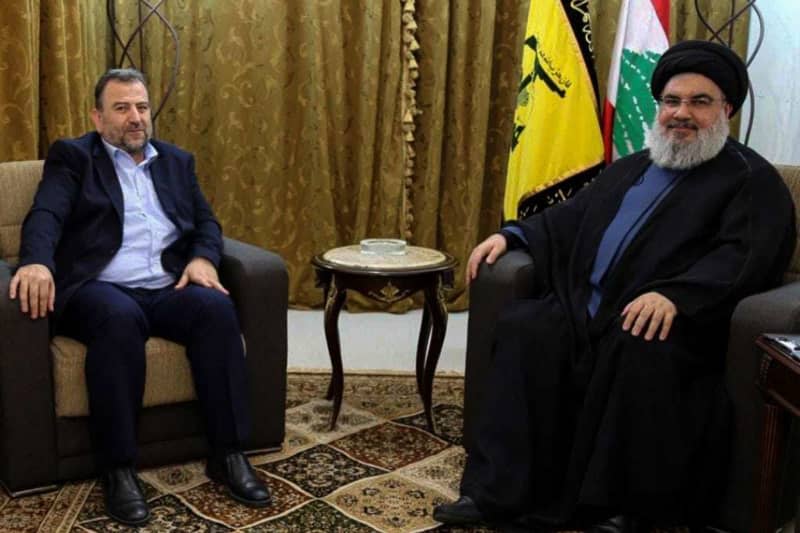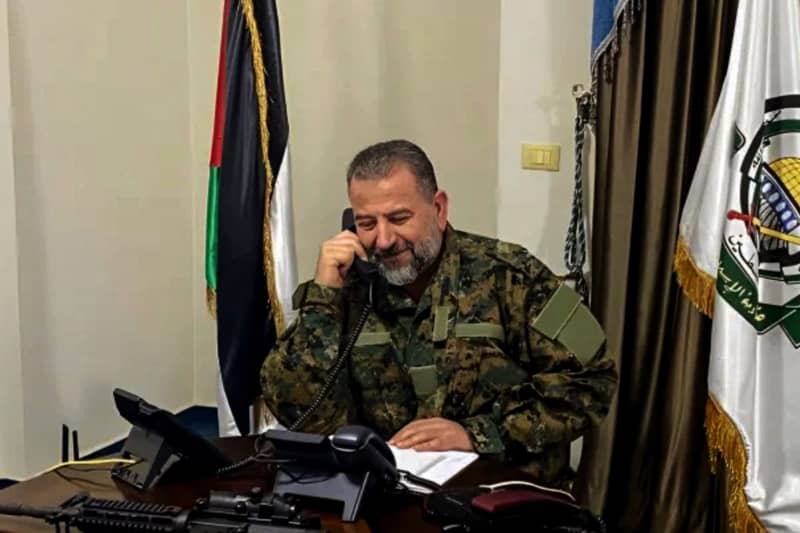Hamas deputy leader al-Arouri killed in Beirut blast, Hezbollah says

Hamas deputy leader Saleh al-Arouri was among seven people killed in a blast in Beirut on Tuesday evening, in a sign that the conflict between Israel and Lebanese militia Hezbollah could escalate even further.
Hezbollah sources and the Hezbollah-affiliated al-Manar television station reported that al-Arouri, the deputy Head of Hamas Political Bureau who lives in Beirut, had died.
Hamas issued a statement in Beirut mourning their leader and listed the names of six others who they said were also killed.
Hamas leader Izzat Al-Rishq issued a statement saying "the assassinations carried out by the Zionist occupation prove once again the abject failure of this enemy to achieve any of its aggressive goals in the Gaza Strip."
In a televised speech on Tuesday, Hamas' chief Ismail Haniyeh described his assassination by an Israeli strike in Beirut as a "terrorist act," and "a violation of Lebanon's sovereignty" and an expansion of Israel's hostility against Palestinians.
Haniyeh mourned al-Arouri and two leaders of the al-Qassam Brigades, Samir Findi Abu Amer and Azzam Al-Aqraa Abu Ammar, who were also killed in the Israeli drone strike.
According to police sources, the explosion occurred in a southern Beirut suburb considered a Hezbollah stronghold, in front of an office of the militant Palestinian organization Hamas, which is engaged in a devastating war with Israel in the Gaza Strip.
State news agency NNA said at least six people were killed in the blast. The cause was initially unclear but reports quickly began to circulate suspecting that it could have been a targeted killing on behalf of Israel.
The Israeli army declined to comment on the reports.
Footage showed at least one car burning near a busy street near the scene of the explosion. Ambulance sirens could also be heard.
According to eyewitnesses, a building was hit by a drone attack. Lebanese media reported that al-Arouri was killed in a flat. Hamas sources said that a Palestinian group had been holding a meeting in the area in the evening.
Lebanese caretaker Prime Minister Najib Mikati condemned Isreal for the explosion, saying that Israel was resorting to exporting its failures in Gaza, and that the blast had a clear implication for Lebanon in confounding "efforts to remove the spectre of war from the country."
"The explosion is an Israeli crime that clearly aims to bring Lebanon into a new phase of confrontations after the ongoing daily attacks in the south," Mikati said, referring to escalation of violence at the border with Israel between Hezbollah and Israeli forces.
The Israeli government has not directly claimed responsibility for the blast but Danny Danon, a senior member of Israeli premier Benjamin Netanyahu's Likud party congratulated Israel's military, intelligence and security forces on the killing of al-Arouri in Beirut.
All those involved in the massacre on October 7 should know that Israel will get to them, he wrote on social media platform X.
According to Israeli media reports, the Israeli cabinet secretary has prohibited the ministers from commenting on the incident. Far-right Israeli Finance Minister Bezalel Smotrich wrote on X: "All your enemies will perish, Israel."
The blast comes as tensions are already running high on Israel's northern border with Lebanon, where pro-Iranian Hezbollah has ramped up cross-border attacks following the beginning of the Gaza war, triggered by the Hamas attack on southern Israel on October 7.
The explosion occurred on the eve of the third anniversary of the killing of General Qasem Soleimani of Iran's Revolutionary Guard Corps (IRGC), who died in a US drone strike in Iraq in 2020. Iranian senior General Sejed-Rasi Mousavi was also recently killed in a suspected Israeli airstrike in Syria.
Al-Arouri is considered one of the founders of the al-Qassam Brigades, the armed wing of the Hamas, and has long been considered a possible target of a potential Israeli attack. He was considered to be responsible for al-Qassam's activities in the West Bank.
Talks between Hamas and Israel on a potential deal to free the remaining hostages in Gaza have reportedly been put on hold following the Beirut strike.
Talks are now focused on avoiding escalation between Israel and Lebanon, Israeli newspaper Haaretz reported on Tuesday evening, citing Arab diplomatic sources.
The "assassination" of Hamas deputy leader Saleh al-Arouri "has changed the situation," the sources were quoted say saying, adding that it was currently no longer possible to negotiate another deal.
The Beirut strike came after another day of violence at the border, and the Israeli military on Tuesday said it has again attacked areas it believes belong to Hezbollah in response to rocket fire from Lebanon.
Parts of the southern Lebanese city of Yaroun came under fire, the Israeli military said on Tuesday, after Hezbollah announced it had fired on Israeli units near the northern Israeli village of Sarit.
Another air alert was triggered in northern Israel on Tuesday morning. There was initially no information about possible casualties on either side of the border.
The latest Gaza war was triggered by the worst massacre in Israel's history, carried out by militants from Hamas and other extremist groups on October 7 in Israel near the border with the Gaza Strip. They killed around 1,200 people.
Israel responded with massive air strikes and a ground offensive, the end of which is currently not in sight.
The number of Gaza Strip residents killed in Israeli attacks has risen to 22,185, the Hamas-controlled health authority said on Tuesday.
That was 207 more than the previous day's figure. A further 57,035 people have been injured since the start of the war, the authority announced on Tuesday. The majority of these are civilians. The figures cannot be independently verified at present.
The Education Ministry in Gaza said at least 4,119 schoolchildren have been killed in the Gaza Strip since the beginning of the war almost three months ago.


